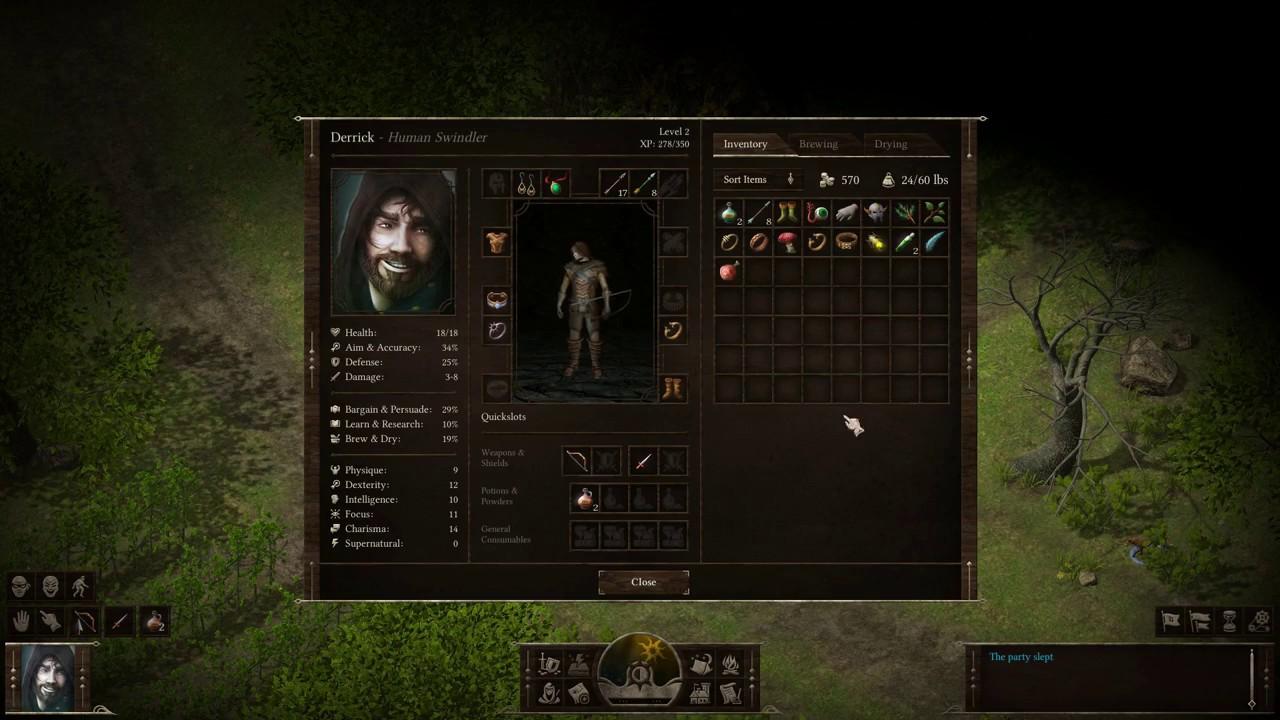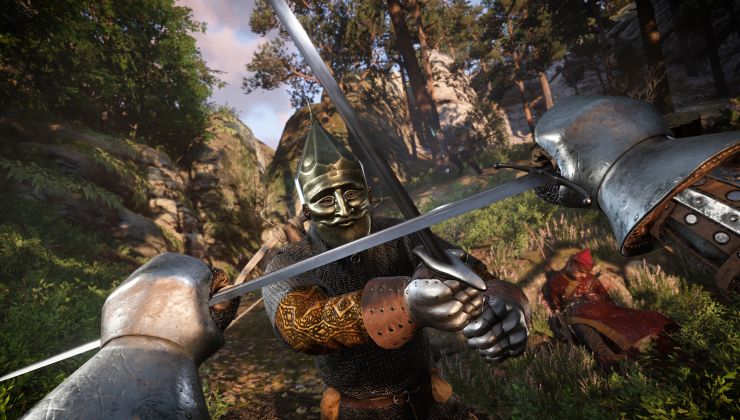Set in a world that’s being beset by a curse of greed, this isometric RPG is trying to put its own unique touches on the tried and true formula.

Direct Link
Black Geyser: Couriers of Darkness [Official Site] is set in a kingdom that’s close to civil war and chaos grows ever day. This is a title that takes clear inspiration from Dungeons and Dragons and games like Baldur’s Gate. Many of the same elements such as an assortment of familiar fantasy race archetypes and classes feature in the game. Things like recruiting characters to your party, primary and secondary quests, magic and abilities, crafting potions and all those other staples will be in there as well.
What caught my eye in this one was the premise of most of the conflict is a curse brought on by a dark goddess that causes greed to grow in the hearts of people. The impact of the curse is determined by the player’s actions as things like looting everything and taking every reward can increase the effects on the world. This can lead to NPCs acting differently and lying, bandits assaulting estates and even the dead rising to reclaim things you’ve looted from them. It’s the sort of thing that I think will make or break the game as how this ties into quests and the meaningful choices players can make in a playthrough will ultimately define how things play out and determine replay value.
Black Geyser has been in development for a while and has turned to crowdfunding to finish up content and to polish the game. It’s projected to be released next year on both GOG and Steam when it’s completed.
You can back the game or read more about it on its Kickstarter page.
Thanks for the tip, Cyril
Not kickstarting though, too much bad experience with linux ports. Maybe when some kind of beta comes out and is playable with feature parity (that one i learned from SotA, still no map, still not optimized, and buggy as hell).
Still , i like those things and this looks very good.
Too scared to crowdfund after I have a copy of Kingdom Come gathering dust since they never bothered to port to Linux.
Last edited by razing32 on 30 Apr 2018 at 8:30 pm UTC
It does look a lot like PoE or maybe a hint of Tyranny ?
Still , i like those things and this looks very good.
Too scared to crowdfund after I have a copy of Kingdom Come gathering dust since they never bothered to port to Linux.
I was also an early backer of Kingdom Come. Thankfully, they honored my request for a refund no questions asked. I'd definitely recommend to anyone else burned by them to also request a refund. Let them know they can't just promise something without delivering.
I guess they felt cryEngine's linux support was in such a terrible state that they'd just not bother. Does it even support Vulkan? probably not, crytek has been sinking for a long time now, doubt any development work has happened to improve the engine. Lumberyard on the other hand.....
It does look a lot like PoE or maybe a hint of Tyranny ?
Still , i like those things and this looks very good.
Too scared to crowdfund after I have a copy of Kingdom Come gathering dust since they never bothered to port to Linux.
I was also an early backer of Kingdom Come. Thankfully, they honored my request for a refund no questions asked. I'd definitely recommend to anyone else burned by them to also request a refund. Let them know they can't just promise something without delivering.
At this point , I may not even bother.
Might as well give it to a friend or something.
Haven't read the entire KS page, but I like everything I've seen about this game so far. I really like the idea of greed being the curse. Greed is not inherent with capitalism but it's certainly a potential side effect.Greed existed before capitalism and will doubtless continue to exist after. Capitalism is just the only system to actually base itself on greed as the main virtue (although most actual humans aren't really very virtuous by our society's standards). Feudal societies based themselves on warrior virtues, and tended to disdain merchants as much because they weren't bloodthirsty enough as because they were too greedy.
Last edited by Purple Library Guy on 2 May 2018 at 1:20 am UTC
Feudal societies based themselves on warrior virtues, and tended to disdain merchants as much because they weren't bloodthirsty enough as because they were too greedy.That's the romantic view of feudalism at least. The truth is, while kings and nobles had it all, merchants got rich in feudal societies as well. Capitalism isn't a radical new economic and political system, just an evolution or adaptation of what was already there. Power brings wealth, and wealth gives power. The focus of greed just shifted slightly from one to the other.
Ideals of a society rarely correspond closely with reality.
Capitalism is just the only system to actually base itself on greed as the main virtue (although most actual humans aren't really very virtuous by our society's standards).I can't agree with this. I could be brain washed, but I don't think greed is a necessary component of capitalism. It was supposed to be more effort equals more reward, however that relationship doesn't scale linearly.
I think of greed as "I want more than you have" whereas "I want more than I have" is not always evil.
Greed existed before capitalism and will doubtless continue to exist after. Capitalism is just the only system to actually base itself on greed as the main virtue (although most actual humans aren't really very virtuous by our society's standards). Feudal societies based themselves on warrior virtues, and tended to disdain merchants as much because they weren't bloodthirsty enough as because they were too greedy.
How interesting that you mention that last part right after I read an article about how Bushido, the supposed way of the Samurai, was essentially bullshit made up by one man at the turn of the 20th century. And related closely to the similarly mythological idea of middle ages chivalry in Europe, itself made up well after the fact. In either case, personal gain was a bigger motivator than honour, and both Samurai and Knights revelled in their status as elites, and the upper ranks of both did pretty well for themselves financially.
Greed existed before capitalism and will doubtless continue to exist after. Capitalism is just the only system to actually base itself on greed as the main virtue (although most actual humans aren't really very virtuous by our society's standards). Feudal societies based themselves on warrior virtues, and tended to disdain merchants as much because they weren't bloodthirsty enough as because they were too greedy.
How interesting that you mention that last part right after I read an article about how Bushido, the supposed way of the Samurai, was essentially bullshit made up by one man at the turn of the 20th century. And related closely to the similarly mythological idea of middle ages chivalry in Europe, itself made up well after the fact. In either case, personal gain was a bigger motivator than honour, and both Samurai and Knights revelled in their status as elites, and the upper ranks of both did pretty well for themselves financially.
You're looking through our lenses. And I don't think saying feudalism relied on bloodthirstiness is romanticizing. Sure, knights and counts and kings wanted "gain", and they liked plunder. But they defined gain differently. Nobody would go around trying to enlarge their fiefdom by buying the next baron out. Half the point of the conquest and plunder was to be, and be seen as, a conqueror and plunderer. It's not even just high medieval--the main viking thing was to try to make a big name for yourself which would be told in tales down the ages. Lasting fame was what the game was about. But how do you get lasting fame? By doing what society valued most. What did society value most? Violence, hands down. Nobody even imagined that you could possibly get the fame men craved by doing anything that wasn't violent.
Anglo-Saxons, who were basically a lot like vikings with fewer boats, believed very strongly in the "man-lord relationship". What was the man-lord relationship about? It was about the lord giving nice things, like gold armbands or snazzy swords or whatnot, to the men in return for their personal loyalty unto death. How was he supposed to get the nice things? By leading them on raids and seizing stuff from enemies, which he would then display his generosity by distributing, with extra to the bravest. These nice things were occasionally used as currency, but mostly these men, these "thanes", lived off farming either directly or knight-style by having subordinates who farmed and were sorta taxed. The nice things were mainly just nice things--analogous in a way to conspicuous consumption, but with totally different symbolism: Having a nice thing didn't mean "I am rich and successful in commerce or at a 'job'", it meant "I am a brave and powerful warrior relied on by my king". The base ethic was all about violence.
Similarly, there was certainly such a thing as "gain" for a feudal lord. But most wealth was "in kind"--your taxes from the peasants were in food and textiles and beeswax and stuff. So what do you do with all that? You maintain a big household and armed force. "Winning" for a feudal lord meant being able to maintain a bigger better army than the next feudal lord, and being able to get glory (and, yes, wealth) by using it violently. Being able to maintain a bigger better army required as much land as possible, ideally fertile prosperous land. So you seize more land so you can support more troops so you can seize more land. As times edged into the Renaissance currency got involved more and more--but that's deeply intertwined with a general shift to a different kind of society with different ideas.
Now in the real feudal/dark ages world, often people did do commerce instead of (or as well as) violence, often did make peace instead of war and so on. People were no more all virtuously violent then than people are all virtuously greedy now. Violence after all has a lot of drawbacks, it kills and destroys; if people all did things the "virtuous" way society would break down. The glory and violence oriented warrior societies always depended on the quiet work of people who were not being glorious or violent, much as our greed oriented capitalist society depends on people who are not themselves capitalists or acting on greed. But the quiet foundation of pre-capitalist society was mostly about agriculture and peasants. Commerce was relatively a frill until pretty late.
What about all the evidence we have of powerful, rich merchant classes in most feudal societies throughout history? Even vikings, known for their bloody conquests and raids as you point out, had a proper trade empire reaching all the way to the middle east and central Asia, as far as their boats would take them. There's not much romance in gathering wealth and it's the warriors and kings who dominate song and legend, but that's beside the point.
Capitalism is just the only system to actually base itself on greed as the main virtue (although most actual humans aren't really very virtuous by our society's standards).I can't agree with this. I could be brain washed, but I don't think greed is a necessary component of capitalism. It was supposed to be more effort equals more reward, however that relationship doesn't scale linearly.
I think of greed as "I want more than you have" whereas "I want more than I have" is not always evil.
I don't think you're brainwashed. But I also think that most people don't actually know what capitalism is in much the same way fish don't know what water is. This also comes up in the way people tend to think of non-capitalist societies as being "really" capitalist except with funny costumes and titles.
The classical economists, whether Adam Smith or Marx, were writing at a time when it was a new thing and were much more interested in distinguishing it from other things that it was not. And as far as I can tell, they pretty much agreed on what it basically is. Capitalism is a system in which some people ("capitalists" or "the bourgeoisie" or whatever) employ other people for wages, investing money in those wages and in some sort of facilities or equipment (whether steel factories or software) for the employees to use to create some kind of valuable commodity. The capitalist owns what is produced, sells it for a profit, and invests the profit in more facilities or equipment or wages, so as to make a bigger profit. The facilities and equipment and stuff, or money earmarked for acquiring them, are "capital". That's why it is "capital"ism. Oddly, it has relatively little to do with markets.
This seems inevitable--how could people not have jobs? How could someone not be the boss employing them? But in the middle ages most production was done by peasants for their own use or to pay taxes. And most production in cities was done by self-employed craftsmen who gathered together in guilds to control prices and enforce quality and shut out competition. Almost anyone else worked mainly in return for food and shelter and even clothing--they might have a small supplemental wage to buy some minor luxuries at the market, but that was secondary. And merchants didn't employ people or produce things, they just bought stuff one place and sold it somewhere else for a higher price. Very few people worked for a wage, or using equipment belonging to other people. Early attempts to get people to work for wages actually met a lot of resistance.
So, where the greed comes in is that the essential nature of capitalist investment is continual expansion--you never stop re-investing profits to make more and more and more. And capitalist economic theories normally define people as maximizers--people who will do anything to increase the amount of money they make and/or wealth they have, who have no other motivations. Of course most people are not themselves capitalist investors employing wage labour, and even most small businesspeople are never really in a position, may not even really want, to reinvest profits and expand continually. But they're supposed to. That's what the right thing to do is, that's what success is. That's "entrepreneurialism"--becoming endlessly richer, through other people's work. It's an elite virtue--people who work for a living can't really participate in it, just as peasants couldn't participate in elite cultures of violence back in the day. But just as peasants were looked down on for not being properly violent (ie not having honour, seeking glory etc), the working class today is looked down on for not being effectively greedy enough. So yes, I'd say greed is capitalism's key virtue, even if real people have never fully bought into it or really had the opportunity.
@Purple Library GuyWhat about 'em? In case you hadn't noticed, we have powerful warrior classes now. And yet I'm not trying to claim capitalism isn't a real thing.
What about all the evidence we have of powerful, rich merchant classes in most feudal societies throughout history? Even vikings, known for their bloody conquests and raids as you point out, had a proper trade empire reaching all the way to the middle east and central Asia, as far as their boats would take them. There's not much romance in gathering wealth and it's the warriors and kings who dominate song and legend, but that's beside the point.
In the old days merchants existed and made money, but they didn't rule, and if aristocrats got fed up with them they took their stuff. What constituted dog and what constituted tail was different, and what was considered the important social virtue was different. Compound interest was often illegal. And who dominates song and legend is far from beside the point. Vikings had song and legend about great warriors, we have news shows dominated by talk of the stock exchange and media that talks incessantly about lifestyles of the rich and famous--many of them famous solely for being rich.
The vikings were actually a little odd in that their merchants, raiders, conquerors, and even peasants, were pretty much all the same people. But a lot of what they traded was precisely things they had stolen while viking--and people, actually; the viking slave trade was huge for a while. But these multi-role people, if you look at their own accounts, cared the most about the raiding and conquest and fighting--that was what made a man respected and followed. The merchant stuff was fine, but it wasn't as important, it wasn't what society was about. I really think we tend to overestimate that aspect because it's what we care about and it reassures us to think people back then were just like us, that what we care about is inevitably what everyone has to care about.
What about 'em? In case you hadn't noticed, we have powerful warrior classes now. And yet I'm not trying to claim capitalism isn't a real thing.Neither am I. And I'm not claiming that feudalism was basically capitalism. All I'm saying is that capitalism is more or less an adaptation and evolution of what was before. As you said, we define capitalism by its differences to other paradigms. This definition serves a purpose, but isn't very objective or scientific. Of course it's by evolution and adaptation that all economic and political systems form.
In the old days merchants existed and made money, but they didn't rule, and if aristocrats got fed up with them they took their stuff. What constituted dog and what constituted tail was different, and what was considered the important social virtue was different. Compound interest was often illegal. And who dominates song and legend is far from beside the point. Vikings had song and legend about great warriors, we have news shows dominated by talk of the stock exchange and media that talks incessantly about lifestyles of the rich and famous--many of them famous solely for being rich.And why do you think people didn't gossip about the lavish lifestyles of rich merchants and traders back then? Again, you might point out that their surviving legends are violent, but so is most modern entertainment.
The vikings were actually a little odd in that their merchants, raiders, conquerors, and even peasants, were pretty much all the same people. But a lot of what they traded was precisely things they had stolen while viking--and people, actually; the viking slave trade was huge for a while. But these multi-role people, if you look at their own accounts, cared the most about the raiding and conquest and fighting--that was what made a man respected and followed. The merchant stuff was fine, but it wasn't as important, it wasn't what society was about.What do you base all this on? Sure, vikings traded on all kinds of valuables and commodities, even slaves, just like their foreign peers. But they were also world class craftsmen. And their merchants, jewelers, blacksmiths and whatnot were just that, not raiders who also dabbled in a bit of trade.
In any case, trying to reduce any society to a single value or ideal is counterproductive. That forces you to ignore the human factor. Life might have been simpler, but not to such an extreme degree.
I really think we tend to overestimate that aspect because it's what we care about and it reassures us to think people back then were just like us, that what we care about is inevitably what everyone has to care about.I'll ignore the slightly patronizing tone, but you're right, I do assume our basic needs are the same as those of people a thousand years ago. I actually think it's the other way around: We tend to romanticize and mythologize people we have no direct experience of. Even famous historians and archaeologists have commonly fallen into this seductive trap. We have this strange need to make history seem exciting when most of it is decidedly not.
But maybe we're getting slightly off topic here? :P
Greed existed before capitalism and will doubtless continue to exist after. Capitalism is just the only system to actually base itself on greed as the main virtue (although most actual humans aren't really very virtuous by our society's standards). Feudal societies based themselves on warrior virtues, and tended to disdain merchants as much because they weren't bloodthirsty enough as because they were too greedy.
How interesting that you mention that last part right after I read an article about how Bushido, the supposed way of the Samurai, was essentially bullshit made up by one man at the turn of the 20th century. And related closely to the similarly mythological idea of middle ages chivalry in Europe, itself made up well after the fact. In either case, personal gain was a bigger motivator than honour, and both Samurai and Knights revelled in their status as elites, and the upper ranks of both did pretty well for themselves financially.
You're looking through our lenses. And I don't think saying feudalism relied on bloodthirstiness is romanticizing. Sure, knights and counts and kings wanted "gain", and they liked plunder. But they defined gain differently. Nobody would go around trying to enlarge their fiefdom by buying the next baron out. Half the point of the conquest and plunder was to be, and be seen as, a conqueror and plunderer. It's not even just high medieval--the main viking thing was to try to make a big name for yourself which would be told in tales down the ages. Lasting fame was what the game was about. But how do you get lasting fame? By doing what society valued most. What did society value most? Violence, hands down. Nobody even imagined that you could possibly get the fame men craved by doing anything that wasn't violent.
Anglo-Saxons, who were basically a lot like vikings with fewer boats, believed very strongly in the "man-lord relationship". What was the man-lord relationship about? It was about the lord giving nice things, like gold armbands or snazzy swords or whatnot, to the men in return for their personal loyalty unto death. How was he supposed to get the nice things? By leading them on raids and seizing stuff from enemies, which he would then display his generosity by distributing, with extra to the bravest. These nice things were occasionally used as currency, but mostly these men, these "thanes", lived off farming either directly or knight-style by having subordinates who farmed and were sorta taxed. The nice things were mainly just nice things--analogous in a way to conspicuous consumption, but with totally different symbolism: Having a nice thing didn't mean "I am rich and successful in commerce or at a 'job'", it meant "I am a brave and powerful warrior relied on by my king". The base ethic was all about violence.
Similarly, there was certainly such a thing as "gain" for a feudal lord. But most wealth was "in kind"--your taxes from the peasants were in food and textiles and beeswax and stuff. So what do you do with all that? You maintain a big household and armed force. "Winning" for a feudal lord meant being able to maintain a bigger better army than the next feudal lord, and being able to get glory (and, yes, wealth) by using it violently. Being able to maintain a bigger better army required as much land as possible, ideally fertile prosperous land. So you seize more land so you can support more troops so you can seize more land. As times edged into the Renaissance currency got involved more and more--but that's deeply intertwined with a general shift to a different kind of society with different ideas.
Now in the real feudal/dark ages world, often people did do commerce instead of (or as well as) violence, often did make peace instead of war and so on. People were no more all virtuously violent then than people are all virtuously greedy now. Violence after all has a lot of drawbacks, it kills and destroys; if people all did things the "virtuous" way society would break down. The glory and violence oriented warrior societies always depended on the quiet work of people who were not being glorious or violent, much as our greed oriented capitalist society depends on people who are not themselves capitalists or acting on greed. But the quiet foundation of pre-capitalist society was mostly about agriculture and peasants. Commerce was relatively a frill until pretty late.
I've asked before but I will ask again (just in case)
Please start a history blog or YT channel :)








 30 Apr 2018
30 Apr 2018




 How to set, change and reset your SteamOS / Steam Deck desktop sudo password
How to set, change and reset your SteamOS / Steam Deck desktop sudo password How to set up Decky Loader on Steam Deck / SteamOS for easy plugins
How to set up Decky Loader on Steam Deck / SteamOS for easy plugins
Oh and the name doesn't mean anything but coincidentally could be pronounced as "Buttery" which suits me just fine.
See more from me